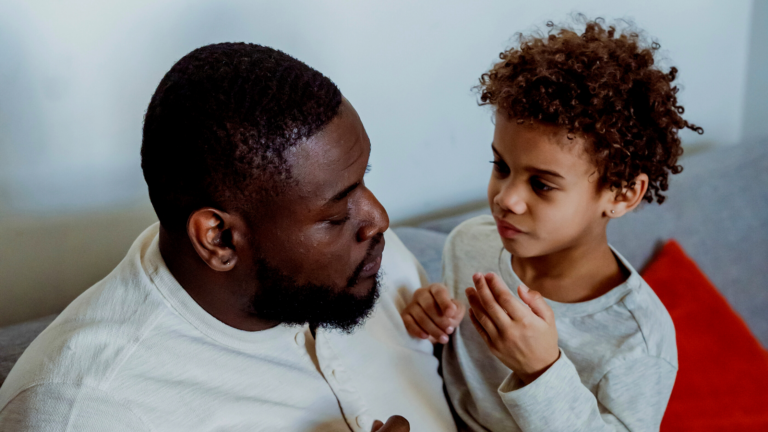We’ve provided these free Parent Conversation Starters to help parents begin intentional dialogue about sexuality with children and teens. Each Starter includes step-by-step instructions for parents to (1) prepare for conversation and (2) initiate conversation, broken down by age-group.
These starters are just that–starters. These are not meant to be one-and-done conversations, but rather a place to begin ongoing conversation. We know these are difficult conversations, which is why we’ve created an on-demand Parent Course, designed to give parents all the tools they need to have compassionate and theologically accurate conversations about sexuality with their kids throughout childhood.
(1) Prepare for Conversation: get familiar with the topic
Topic Summary: Where is God in all of this? How can Christian parents respond to and reduce feelings of shame?
So far, our Parent Conversation Starters have focused on things you should teach your kids, regardless of their sexuality. All kids should grow up learning about family, intimacy, sexual ethics, Christian singleness, and the necessity of close friendships. But how can we parent in such a way that if our child one day experiences same-sex attraction, he or she is not ashamed before God and is able to feel close to God?
Parents, read Equip’s blog post about God’s presence and gay people. As you read, pause and reflect on the following questions:
-
Reflect on the way you talk to your kids about God. If one of your kids one day experiences same-sex attraction, will he/she feel shame about his/her sexuality based on what they were taught about God, the Bible, and prayer?
-
How are you inviting your kids to be honest with God in all circumstances and with all of their emotions?
-
We all feel shame at times. How are you responding when you see your child experiencing shame (for example, their weight or a learning disability or a parent’s job)?
-
How are you helping your child reject the lies shame brings?
-
How are you using prayer, music, and the Bible now with your kids? Are you weaponizing those things in any way against them? How can you use those things to invite your kids into relationship and intimacy with God?
(2) Initiate Conversation: ask good questions
With your deepened understanding of the topic, initiate conversation with children and teens with age-specific questions.
Conversation about LGBT+ topics should take place within a broader conversation about the need for everyone to steward their sexualities in God-honoring ways. Here’s a brief summary of what all children need to know about sexual stewardship–please ensure your children have grasped these foundational truths before exploring sexual minority-specific conversations:
-
God created all of us to enjoy human intimacy in the context of life-long, lived-in family, and we find that family through one of the vocations God created: Christian marriage or vocational singleness. As our kids enter their young adult years, they will begin to discern with (ask) God which vocation He has given to them.
-
Humanity’s sin has bent and broken the goodness of everything God created. We see the results of this bending and breaking everywhere. We are all broken in the area of sexuality, and none of us can do intimacy or family perfectly. Encourage your child to share with you when they discover where broken sexuality is part of their story.
-
We are still able to find beauty and goodness and flourish in this broken world because God offers us His wisdom through the Bible and the Church. When we follow God’s wisdom, we’ll find the greatest joy, the deepest meaning, and the richest belonging in this life.
Conversation Starter for Ages 2-9
If you have children ages 2-9, use this discussion guide to begin a conversation about shame.
“Do you remember what God thought when He looked over His creation? The Bible says, “God saw all that He had made, and it was very good” (Genesis 1:31). That includes humans, us! We’re created in God’s very image (Genesis 1:26-27), and we carry His likeness everywhere we go. God created us good.
“You know what else? God loves us! And He wants us to enjoy spending time with Him by reading His Word, by praying, and by worshipping Him. God doesn’t want anything to come between us and Him.
“Sometimes, though, our brokenness can get in the way of our friendship with God. Sometimes we feel guilty because we disobeyed God or broke one of His laws.
But sometimes there’s a wall between us and God even when we haven’t done anything wrong.
“Have you ever heard the word shame? Guilt is feeling bad because we did something wrong. But shame is believing that we are bad and beyond God’s love. Shame is actually a tool Satan uses to convince us to ignore the fact that we are created in God’s image.
“Have you ever felt shame? Would you like to tell me about it?
“Please know that God loves you. He created you in His own image. He doesn’t want you to feel shame; you are not bad, and you are not beyond His love.
“Let’s pray and thank God that He created us good, in His image. And let’s ask Him to help us remember that He loves us and we will never be beyond His love.”
Conversation Starter for Ages 10-13
If you have children ages 10-13, use this discussion guide to begin a conversation about shame.
“Do you remember what God thought when He looked over His creation? The Bible says, “God saw all that He had made, and it was very good” (Genesis 1:31). That includes humans, us! We’re created in God’s very image (Genesis 1:26-27), and we carry His likeness everywhere we go. God created us good.
“You know what else? God loves us! And He wants us to enjoy spending time with Him by reading His Word, by praying, and by worshipping Him. God doesn’t want anything to come between us and Him.
“Sometimes, though, our brokenness can get in the way of our friendship with God. Sometimes we feel guilty because maybe we disobeyed God or broke one of His laws.
But sometimes there’s a wall between us and God even when we haven’t done anything wrong.
“Have you ever heard the word shame? Guilt is feeling bad because we did something wrong. But shame is believing that we are bad and beyond God’s love. Shame is actually a tool Satan uses to convince us to ignore the fact that we are created in God’s image.
“Have you ever felt shame? Would you like to tell me about it?”
“I want to read you a story written by a person deeply familiar with shame.”
I was watching a college football game with my family over Christmas break. Then it hit me. That feeling I’ve felt far too often over the past twenty-seven years. Shame. I noticed an attractive player on one of the teams, and then a painful void opened up in my gut.
I didn’t lust over this man. I didn’t entertain the attraction in any way. I didn’t do anything more than notice that he was a good-looking guy. But for the first twenty years of my life, I believed that being gay—merely experiencing same-sex attraction—was bad. I believed that I should feel shame and embarrassment each time I find myself attracted to another man. Because I believed those things for twenty years, my automatic reaction to finding the football player attractive was shame.
A quick note about shame versus guilt. Clinical mental health counselors like me make a point to distinguish between these two words. Guilt is feeling bad because we did something wrong. Shame is believing that we are totally, completely, beyond-redemption bad to our core. Guilt is a just response to disobeying God. Shame is an emotion stoked by Satan that convinces us to disregard the imago dei in each of us. When I noticed the football player was attractive, I did not sin and did not feel guilt. But, Satan has spent a lifetime conspiring against me, often through the words of other Christians, to teach me that because I am gay, I am totally, completely, beyond-redemption bad. And so I felt shame.
I texted a safe person. Shared with her everything I was feeling, trying to shake the shame. She responded with what I’ve heard a hundred times: “There’s nothing you need to feel ashamed about. Nothing you need to be embarrassed about. You’re just as normal as the rest of us.”
I know she’s right, but I don’t think my automatic reactions to my attractions will ever be anything but shame. I don’t believe her words on an emotional level. Every time I notice an attractive person, my automatic reaction is to believe that I am less worthy of the love of God and my friends. My automatic reaction is to assume there is something I need to fix, because I am not good enough. Then as I sat on the couch trying not to look overwhelmed, shame turned to sadness. My heart looked to the future and anticipated a lifetime of feeling shame for something I did not choose and could not change.
“What are your thoughts about this story?
Should this guy feel shame for his attractions, attractions that he didn’t choose and can’t change?
What are some things this guy’s church or family could have done to ensure he didn’t feel shame about his attractions?
What would you do if one of your friends mentioned being attracted to people of the same gender? How could you help him/her avoid shame?”
“Please know that God loves you. He created you in His own image. He doesn’t want you to feel shame; you are not bad, and you are not beyond His love.
If you ever feel like the guy in the story–attracted to people of the same sex–please tell me. I want you to know that you don’t choose who you are attracted to, you’re not alone and you don’t have to make sense of this alone, you don’t need to feel ashamed–I know this isn’t your fault, God is not surprised and He doesn’t love you any less and He has great plans for you, I’m not going to try to make you straight, and I want to walk through this with you. Please don’t ever feel afraid to tell me; I won’t love you any less.
“Let’s pray and thank God that He created us good, in His image. And let’s ask Him to help us remember that He loves us and we will never be beyond His love.”
Conversation Starter for Ages 14+
If you have children ages 14+, read this blog post about shame with them and then discuss some or all of the following questions with them.
-
What stood out to you as we read? What’s something new you learned?
-
Before reading, would you have been able to articulate the difference between guilt and shame? Have you ever felt guilt? Have you ever felt shame? Would you like to share?
-
When you feel shame, what is your typical reaction?
-
If shame doesn’t come from God, why do we sometimes feel shame before God about things we didn’t choose and can’t change? Why do you think this is especially true for sexual minorities?
-
The author says, “Every time I notice an attractive person, my automatic reaction is to believe that I am less worthy of the love of God and my friends. My automatic reaction is to assume there is something I need to fix because I am not good enough.” What are some ways the Church could have mitigated the author’s shame as he grew up? How can the Church respond in compassion now to the difficulty the author has connecting to God because of his shame? (Parents, reference the blog post at the top of this handout titled “Where is God in All of This?”)
-
How can you be a compassionate friend to the people in your life who experience same-sex attraction? How can you help them reject the shaming messages of Satan?
Equip’s Parent Course includes over 50 example scripts you can use with kids ages 2-12 to talk about marriage and singleness, intimacy and family, sex and sexuality. Check out a free preview and get access here.






